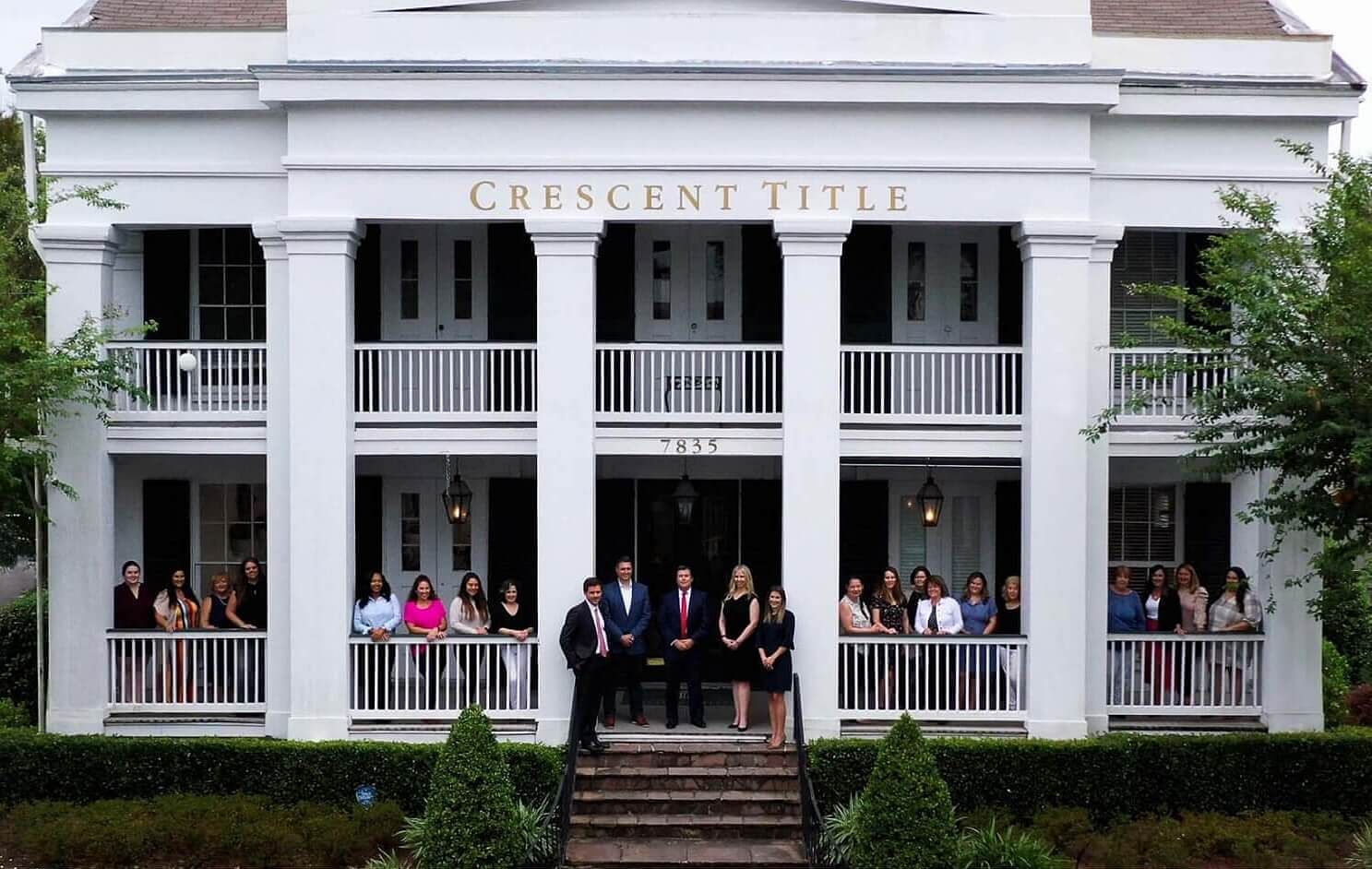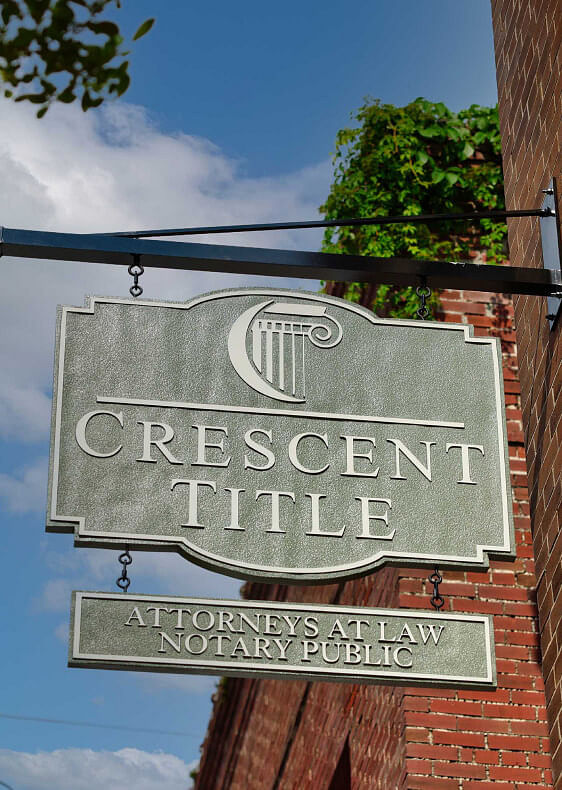Title Insurance Company in Louisiana

Buying or selling property in Louisiana moves fast once a contract is signed, yet the details behind the deed can stretch back decades. Title insurance exists for that exact reason, because a clean-looking chain of ownership can still hide old liens, recording errors, missing signatures, boundary disputes, and other issues that can surface at the worst possible time. Crescent Title helps buyers, sellers, realtors, and lenders close with confidence by pairing thorough title work with clear communication and strong fraud safeguards.
Choosing a title insurance company in Louisiana should feel like choosing a steady partner, not gambling on who answers the phone. Crescent Title focuses on attorney review at every office, practical policy options for real-world closings, and pricing expectations that are explained early. The goal stays simple: protect the transaction, protect the people involved, and keep the closing on schedule.
Why Title Insurance Matters in Louisiana Real Estate?
Most people assume a title problem would have shown up long ago, especially if the property has changed hands multiple times. Real estate records do not always cooperate, because paperwork gets misfiled, names are misspelled, releases are never recorded, and older documents can contain mistakes that stay buried until a new sale, refinance, or inheritance transfer forces a closer look. Title insurance steps in to protect against covered issues tied to the property’s history, not today’s buyer’s behavior.
Louisiana adds its own complexity because property transfers, successions, and community property considerations can create more moving parts than people expect. A strong title team looks beyond the surface, checks the right records, and flags concerns early enough to fix them without derailing the deal. Crescent Title approaches each file with a “verify everything” mindset, because a smooth closing is usually the result of careful work long before anyone sits down to sign.
What Title Insurance Covers in Louisiana?
Title insurance is designed to protect against certain losses related to ownership rights and the legal status of the title. Coverage commonly involves issues such as undisclosed liens, errors in public records, forged documents in the chain of title, or missing heirs who later claim an interest in the property. Some issues are obvious once discovered, while others only appear after a lender funds, a buyer moves in, or a future sale hits a snag.
Protection matters because fixing a title defect can become expensive, time-consuming, and emotionally draining, especially when a family home or a major investment is on the line. Title insurance is not a maintenance plan for future events, since it generally focuses on past issues that already exist as of the policy date. Crescent Title helps clients understand what is covered, what is not, and which policy type best matches the transaction.
Owner’s Title Insurance vs. Lender’s Title Policy in Louisiana
A lender’s title policy protects the lender’s interest in the property, which means it is primarily about the loan balance and the lender’s ability to enforce the mortgage. Many buyers assume that policy also protects them personally, yet it does not provide the same protection for the homeowner’s equity and ownership rights. The lender is protected first, and the borrower is not the beneficiary of that protection in the way most people imagine.
Owner’s title insurance in Louisiana protects the buyer’s ownership interest, which is the part that matters if a covered claim challenges the buyer’s right to the property. Owner coverage can also help with legal defense for certain covered disputes, depending on the policy terms. Crescent Title walks buyers through the difference in plain language, because a clean explanation upfront prevents painful surprises later.

Do You Need Owner’s Title Insurance in Louisiana?
Owner’s coverage is optional in many transactions, but “optional” does not mean “unnecessary.” A buyer can purchase the property in good faith, sign everything correctly, and still face a claim tied to an old lien that never got released, a boundary conflict that was never resolved, or a signature problem in an earlier transfer. Owner’s title insurance is designed for that kind of scenario, where the buyer did nothing wrong yet still needs protection.
The decision often comes down to risk tolerance and the value of peace of mind, especially for people buying in competitive markets where closings need to stay on track. A home purchase can represent years of savings, and equity can grow quickly in the right neighborhood. Crescent Title helps buyers evaluate the practical value of owner’s coverage based on property history, transaction type, and the realities of Louisiana recordkeeping.
Title Insurance Costs in Louisiana: What to Expect
People want a clean number, yet pricing depends on the specifics of the transaction. The purchase price, loan amount, policy type, and the work required to clear the title can all influence the final figures. Cost transparency matters, because a closing estimate should never feel like a surprise party.
A dependable title insurance company explains pricing expectations early, clarifies what is included, and separates title insurance premium from other settlement services. Good estimates also acknowledge what can change, because a file that needs curative work or extra documentation may require additional time and coordination. Crescent Title prioritizes clear, practical explanations that help buyers, sellers, and lenders plan confidently without guessing what the bottom line will look like.

How to Compare Title Insurance Providers in Louisiana
Comparing title insurance providers should go beyond the lowest quote, because the most expensive part of a closing is usually the problem that was missed. Service quality shows up in the details: how quickly the team identifies defects, how clearly they communicate with agents and lenders, and how steadily the file moves toward closing day. A provider’s process matters as much as the policy itself, since policy protection starts with the quality of the title work.
Attorney involvement also belongs on the checklist, because legal review can help identify issues that are easy to overlook when the file is treated like a checklist instead of a legal transaction. Security practices matter too, since real estate fraud has become more sophisticated and more targeted. Crescent Title brings these priorities together, helping clients compare providers based on what truly protects the deal.
Attorney Review at Every Crescent Title Office
Real estate closings create legal consequences, even when the process feels routine. Attorney review adds a layer of confidence, because legal oversight helps catch inconsistencies, verify documentation, and guide solutions when a title issue needs curative action. That guidance matters when deadlines are tight, emotions are high, and multiple parties need answers that hold up under scrutiny.
Crescent Title emphasizes attorney review at every office so clients receive consistent standards, not a different experience depending on which desk picks up the file. Realtors and lenders benefit because decisions are documented and communicated clearly, which helps prevent last-minute delays. Buyers and sellers benefit because the transaction is handled with the seriousness it deserves, without turning the process into something cold or complicated.
Policy Options That Match the Way You Buy, Sell, or Lend
Real estate does not come in one standard shape, and title insurance should not be treated like one-size-fits-all. A first-time buyer purchasing a home needs a different level of guidance than an investor doing a quick acquisition, and a lender refinancing a seasoned loan has different priorities than a lender funding a new build. Policy options exist to match those realities, and the best title teams explain them without overwhelming clients with jargon.
Crescent Title helps clients evaluate title insurance Louisiana policy choices with a focus on what changes risk in the real world. The conversation stays grounded in the property type, the transaction structure, and the parties involved. Coverage decisions become easier when the options are explained with practical examples instead of vague promises.
Policy Options That Match the Way You Buy, Sell, or Lend
Fraud in real estate often targets the moment money changes hands, because wire instructions, email inboxes, and document transfers can be exploited quickly. A secure closing process treats every communication channel as a potential risk point, which means teams verify identity, confirm instructions through trusted methods, and document each step. Security is not a buzzword when a single compromised message can create serious financial loss.
Crescent Title builds fraud prevention into everyday workflow, not just into a warning at the end of an email. Buyers, sellers, realtors, and lenders benefit from a culture that prioritizes verification and clear instruction, especially when the transaction involves large sums and tight deadlines. Confidence grows when everyone knows the rules and the rules are enforced consistently.


Local Support Near New Orleans, Metairie, Mandeville, Hammond, and Destrehan
Searches like title insurance near me New Orleans, Metairie, Mandeville, Hammond, and Destrehan usually mean someone wants a team that understands the local pace of the market and communicates like humans, not ticket numbers. Local support matters because closings often involve quick decisions, coordination with nearby agents, and real-time updates that keep everyone aligned. A Louisiana transaction can include unique property histories, succession considerations, and record nuances that benefit from local familiarity.
Crescent Title serves clients who want accessibility without sacrificing professionalism. Realtors and lenders appreciate a responsive partner who keeps files moving, while buyers and sellers appreciate clarity and steady guidance from contract to closing table. Local presence becomes even more valuable when a file needs extra attention, because solutions are easier to execute when the team knows the area and the process.
A Straightforward Closing Process From Contract to Keys
-
Opening and File Setup: Crescent Title receives the contract or lender order, confirms key details, and sets expectations for timeline and documentation. Communication begins early so realtors, lenders, buyers, and sellers know what will be needed and when it will be needed. A clear start prevents confusion that can snowball later in the process.
-
Title Search and Attorney Review: The team examines the chain of title, reviews recorded documents, and looks for issues that could affect ownership or financing. Attorney review helps interpret findings and guide solutions when the record reveals something that must be cleared before closing. Curative work is handled with urgency, because the best delays are the ones that never happen.
-
Clear Estimates and Closing Coordination: Costs and policy options are explained with practical clarity, including what may change if additional work is required. Scheduling is coordinated with all parties so signing day stays calm instead of chaotic. Details are confirmed carefully, because small errors can create large closing-day headaches.
-
Secure Signing and Funding: Identity verification, document review, and secure handling of funds protect the transaction against common fraud tactics. Instructions are confirmed through reliable channels so nobody is relying on last-minute emails that could be compromised. The goal is a clean closing where everyone understands what they are signing and why it matters.
-
Recording and Finalization: Documents are recorded properly, policies are issued, and the file is completed with attention to accuracy. Clients receive confirmation that the transaction has been finalized and that critical documents are handled correctly. Peace of mind is not just a feeling, it is the result of a process done right.
Why Realtors and Lenders Keep Crescent Title on Their Short List
Communication That Protects the Timeline: Updates are shared in a way that helps realtors and lenders manage expectations without chasing down answers. A file moves faster when everyone has the same information at the same time. That consistency also reduces the stress buyers and sellers feel as closing day approaches.
Attorney Review That Supports Confident Decisions: Legal oversight helps evaluate title issues quickly and responsibly, especially when a transaction requires curative work. Decisions are documented and explained clearly so the solution is not just fast, it is sound. Realtors and lenders benefit because clarity prevents last-minute surprises that can derail funding and signing.
Pricing Expectations That Feel Straightforward: Clear explanations help clients understand how title insurance premiums differ from settlement services and why certain costs exist. A good estimate is not a vague range, it is a practical plan with honest variables. That approach builds trust with buyers, sellers, and lending teams who want predictability.
Security Practices Built Into the Process: Fraud prevention is treated as a daily discipline, not a checkbox at the end of the file. Verification steps are handled consistently so wire and document handling stays protected. Confidence rises when the process is secure and the team explains how to avoid common scams.


Common Closing Scenarios Crescent Title Handles Across Louisiana
Purchases for First-Time and Repeat Buyers: Buyers receive guidance that stays friendly and clear, even when the transaction involves complex documentation. Owner’s coverage is explained in practical terms so buyers understand what they are protecting. The closing experience stays focused on clarity, because clarity reduces anxiety and prevents delays.
Sales That Need Clean Payoffs and Clear Documentation: Sellers benefit from a team that coordinates payoffs, resolves title requirements, and keeps the process moving toward a clean transfer. Documentation is handled carefully so the deed and related records reflect what the parties intended. A well-managed sale protects reputations for agents and reduces stress for everyone involved.
Refinances and Loan Transactions for Lenders: Lenders need reliable turnaround, accurate documentation, and a process that supports secure funding. Title work is performed with an eye toward what lenders need to close confidently, including clear requirements and consistent updates. Strong coordination helps prevent funding delays that can frustrate borrowers and loan teams.
Transactions Involving Successions, Family Transfers, and Complex Ownership: Louisiana property history can involve heirship questions, prior transfers, and older documentation that must be handled correctly. Attorney review becomes especially valuable when ownership is layered or unclear. Careful curative work helps protect the transaction while respecting the people involved.
Choose Crescent Title for Louisiana Title Insurance
Real estate should feel exciting, not uncertain, and the right title partner makes a measurable difference. Crescent Title combines thorough title work, attorney review at every office, clear policy guidance, and strong fraud protection so buyers, sellers, realtors, and lenders can move forward with confidence. The process stays professional, upbeat, and focused on protecting everyone’s interests.
If you are comparing options for a title insurance company Louisiana clients can rely on, Crescent Title is ready to help you close cleanly and securely. Reach out to Crescent Title to discuss your transaction, review policy options, and get clear pricing expectations you can plan around.
Choose Crescent Title for title insurance services across Louisiana that protect your closing from start to finish.

Are You Ready To Get Started?

